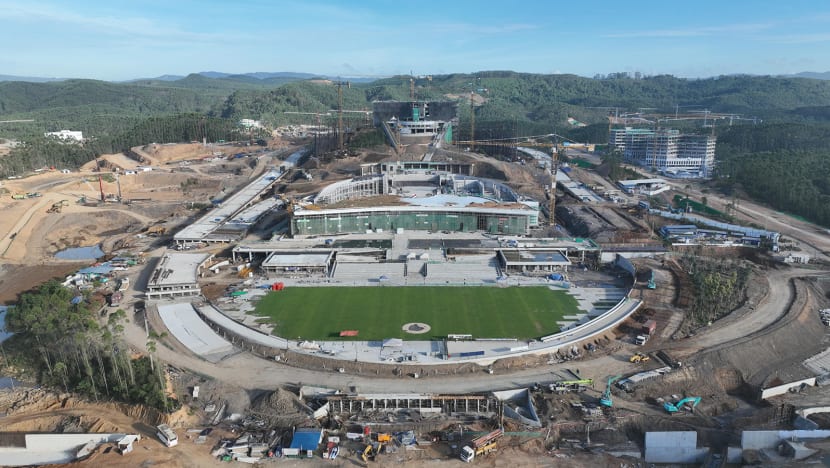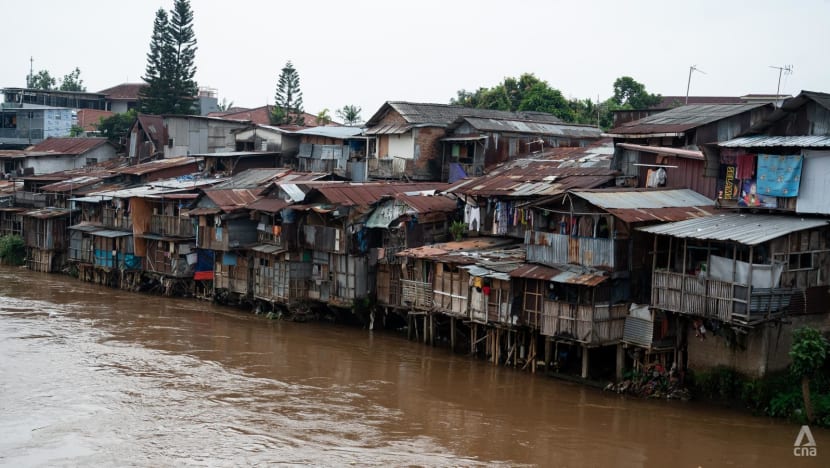New master plan to save Indonesia’s Jakarta from urban woes, with Jokowi’s son Gibran touted to helm efforts
Outgoing president Joko Widodo has paved the way for the Jakarta Agglomeration Area Council to solve the city’s ongoing problems. But addressing its crippling traffic, floods and pollution requires the city to tackle overdevelopment and cooperate with its surrounding suburbs. Is this new body enough?


This audio is generated by an AI tool.
JAKARTA: A new master plan is on the horizon to save Indonesia’s biggest city, Jakarta from various urban woes - even after it’s displaced by Nusantara as the country’s capital - by improving coordination at central government level and with neighbouring cities.
It is part of a newly formed authority known as the Jakarta Agglomeration Area Council, with incoming vice-president Gibran Rakabuming Raka - President Joko Widodo’s son - among the names touted to head it.
The council is tasked to come up with a blueprint to solve problems such as transportation, flooding, spatial planning and environmental degradation in Jakarta and its suburbs, and coordinate its implementation with related ministries, provinces, cities and regencies.
But experts are sceptical about whether its presence will be enough to solve these complex issues, saying that success will greatly depend on who will helm it.
Experts also pointed out that solving issues like crippling traffic, seasonal flooding and worsening air pollution, requires Jakarta to work together with its satellite cities and suburbs which are administratively in the neighbouring provinces of West Java and Banten.
“One of the reasons why flooding is rampant in Jakarta is because there is overdevelopment in the upstream areas in Bogor,” Mr Nirwono Joga, a city-planning expert from Jakarta’s Trisakti University, said, referring to the mountainous regency south of Jakarta.
“Tackling Jakarta’s flood problem begins by limiting the amount of villas and hotels being built in Bogor which are inhibiting the ground’s ability to absorb water. But why should (Bogor officials) help Jakarta when these villas, hotels and restaurants are a major source of revenue for the regency?
FROM JAKARTA TO NUSANTARA
The Jakarta Agglomeration Area Council came into effect as part of a new legislation signed by Mr Widodo, which officially designated Nusantara as the new capital city that will be inaugurated on Aug 17 during Indonesia’s 79th Independence Day celebrations.
Building a new capital from scratch in the rolling hills of Borneo is supposed to ease some of Jakarta’s burden. At least, that was what Mr Widodo, who is popularly known as Jokowi, was hoping for when he announced the plan in 2019 to move the capital from the Java city to Nusantara.
Indonesia is looking to relocate around 120,000 civil servants working in various ministries and government agencies in Jakarta to Nusantara over the next three years, according to a statement from minister of state apparatus utilisation and bureaucratic reform, Abdullah Azwar Anas on Apr 17.

But observers point out that even if the government workers move along with their families, this figure is just a tiny fraction of the metropolitan area’s current population.
“Not everyone will bring their families to the new capital immediately. There are still not enough facilities for them there like housing, hospitals and schools,” Mr Yayat Surpiyatna, another city-planning expert from Jakarta’s Trisakti University told CNA.
Analysts also say Jakarta will likely retain its status as the country’s economic and commercial hub and with it, the title of one the most congested and polluted cities in the world for many years to come.
The overdevelopment of the metropolis and its surrounding suburbs, which around 34.5 million people call home, is also to blame for seasonal floods which affect thousands of residents living on its narrowing river banks.
In addition, it struggles with land subsidence and rising sea levels which threaten millions of people residing in its coastal areas.

GETTING EVERYONE TO WORK TOGETHER
Indonesia’s home affairs minister Tito Karnavian said the council will focus on “harmonising” different programmes and policies issued by various governments inside the Greater Jakarta region.
“There needs to be a single master plan and a body that oversees this from planning to regular evaluation so that everything is synchronised,” Mr Tito said in March, adding that various ministries will also be involved in the formulation and execution of this integrated master plan.
The home affairs ministry earlier proposed that the council would be chaired by the vice president. Mr Tito defended the proposal saying it needs to be headed by someone of such authority.
“These problems cannot be handled by a minister … not even a coordinating minister because these are cross-sector issues. The president has too much responsibility already, so the involvement of a vice president (to chair the council) is needed,” he said.
Although this proposal was later dropped following rejections from a number of political parties, the legislation states that the president has the authority to appoint members of the council as well as define what their roles and authority will be.
Jokowi’s term ends in October, meaning that the council will likely be appointed by his successor, Mr Prabowo Subianto.
The incoming president can still choose whomever he pleases, including his vice president, Mr Gibran.
Mr Gibran is Jokowi’s eldest son. The 36-year-old, who has only been in the bureaucracy since 2021, is now the mayor of Surakarta, a city in Central Java with a population of 575,000.
“Will these regional leaders, who are mostly in their 50s, listen to the vice president? Does he understand Jakarta’s problems? Can he make a quick decision?” asked Mr Joga.
A capable hand at the helm is important if the council is to effectively tackle Jakarta’s issues, say experts.
Based on an annual global traffic index by navigation specialists TomTom, Jakarta was the 30th most congested city out of 387 surveyed in 2023. Last year, motorists in Jakarta spent an average of 23 minutes and 20 seconds to drive 10km, 40 seconds more than the year before.
Meanwhile, Indonesia’s National Development Planning Agency estimated that on average, a flood results in around US$532 million of property and infrastructure damage in the metropolitan area.

Jakarta is also notorious for its air pollution. According to its 2019 Air Quality Life Index study, the University of Chicago’s Energy Policy Institute said on average the residents of Jakarta are exposed to more than six times the PM2.5 particle concentration level recommended by the World Health Organization (WHO).
The institute estimated that Jakartans could gain 5.5 years of life expectancy on average if the city’s air quality complies with the WHO guideline.
It is not clear how much power the new council will have to address these issues.
What is clear is that the new body will report directly to the president and its jurisdiction covers Jakarta, its four satellite cities and four regencies. Combined, these cities and regencies have a size of around 6,700sq km in size, about 10 times the size of Jakarta itself.
“(The council) has to address the problems faced by everyone in the Greater Jakarta area ranging from poor public transportation networks, basic infrastructures, flood prevention, all the way to sanitation. Can (it) come up with a master plan and more importantly will it have the ability to instruct various ministries, municipalities and provinces to work together and implement its policies?” asked Mr Yayat.
Related:
Experts noted that similar bodies have existed before, including the Jabodetabekjur Development Cooperation Board which was established in 2010, to make sure that the various regions’ spatial planning policies and infrastructure developments are in line with one another.
Jabodetabekjur is an acronym for Jakarta and its surrounding suburbs: Bogor, Depok, Tangerang, Bekasi and Cianjur.
But the majority of these bodies only had the mandate to provide policy recommendations and technical assistance without the authority to resolve conflicts or impose sanctions on governments which chose to ignore its instructions.
“If the agglomeration council is only limited to staging coordination meetings and making recommendations then it is doomed to fail,” Mr Yayat said.

COMING UP WITH A WIN-WIN SOLUTION
But getting two governors, four mayors and four regents to work together with Jakarta is a tall order, especially with the former capital standing to benefit the most from the cooperation.
“These regional leaders are elected every five years so the interests of their voters and the political parties supporting them come first,” said Mr Joga.
Economist Mr Nailul Huda of the think-tank Centre of Economic and Law Studies (CELIOS), noted that the current legislation is still vague as to whom these mayors and regents should answer to when the needs of Jakarta are not in line with those of the West Java and Banten administrations, where these suburbs are administratively located.
“There will be an overlap of authorities between the (Jakarta Agglomeration Area) council and the provincial governments,” he said, adding that these mayors and regents also need to answer to their respective city councils and parliaments.
Mr Joga, the city-planning expert said there needs to be an incentive for the suburbs to forge such cooperation with Jakarta.
“Jakarta has a good healthcare system, why not share it with its neighbours? Allow residents of Depok and Bekasi to be treated in public hospitals in Jakarta and in exchange the suburbs will allow the MRT and bus lines to extend beyond Jakarta’s borders? Why not work together to build a joint waste treatment facility? Jakarta has the money but it doesn’t have the space (for such a facility),” he said.

This year, Jakarta has an annual budget of 81 trillion rupiah (US$5 billion) while its neighbouring cities Tangerang and Bekasi have a budget of 5.3 trillion rupiah and 6.3 trillion rupiah respectively.
“Why not earmark some of Jakarta’s money to help its neighbours to, for example, build better public transportation networks so people don’t have to rely on private vehicles all the time which in turn reduces traffic congestion in both the suburbs and Jakarta?” Mr Joga said.
Experts say such cooperation is more vital than ever, now that Jakarta is no longer Indonesia’s capital.
“Before, places like Bogor for example were somewhat motivated to revitalise water catchment areas because they know it will affect the decision-makers in Jakarta. The presidential palace for example might be flooded if they don’t do something,” Mr Firdaus Ali, chairman of Jakarta-based think-tank, the Indonesian Water Institute, told CNA.
Mr Firdaus said the body must be able to come up with a solution that is a win for both Jakarta and the suburbs. He said it can provide funding and incentives for the suburbs to preserve water catchment areas, take action against industries polluting the waterways or build dams and reservoirs.
“This agglomeration council must break administrative barriers. They need to solve these problems as fairly as possible so that the solutions are mutually beneficial for everyone.”

















